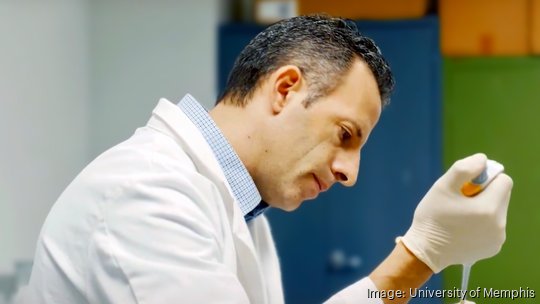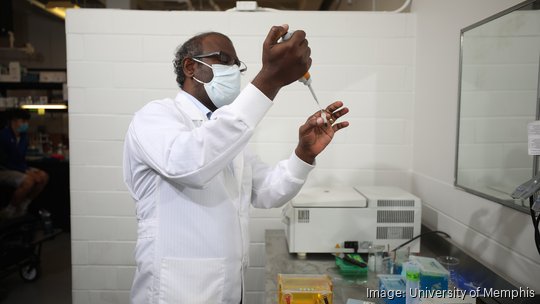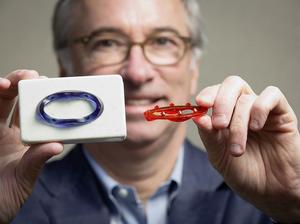
For more than three decades, Richard Bloomer, Ph.D., has focused on nutrition and exercise. He’s done a significant amount of both cardio and weight training over the years, and his interest in wellness has been mixed with an interest in products people often tie to it: dietary supplements.
He’s taken fish oil and multivitamin minerals. He's used protein powder to make meal-replacement shakes.
“I've used multiple nutritional supplements over the years and always had an interest in those from a functional perspective, 'How can these things actually help?'" he said.
Bloomer is far from the only one who’s been intrigued by the alleged benefits of dietary supplements. Their popularity is continuing to rise — Bloomberg has reported that their market size is expected to reach $350 billion by 2032 — and these days, they seem to be everywhere.
“Most people, in their kitchen cupboard, I bet they have multivitamin minerals, vitamin D, maybe some protein powder, probiotics, all sorts of different things,” Bloomer said.
Bloomer's career
Bloomer, however, has taken his interest further than most and spent much of his career researching the effects and qualities of dietary supplements. He started to work with supplements as a graduate student at Ithaca College in the late 1990s and continued to study them as he earned his doctorate from the University of North Carolina at Greensboro. He then held positions at Duke University Medical Center and Wake Forest University, before arriving at the University of Memphis in 2004, as an assistant professor.
At the U of M, his research with dietary supplements continued and grew as his career progressed. In 2015, Bloomer was named dean of the College of Health Sciences. And in 2016, he retained this job while also being named director of U of M’s Center for Nutraceutical and Dietary Supplement Research (CNDSR) — which evaluates the safety and efficacy of botanical agents, dietary ingredients, and finished dietary supplements through cell culture experiments, animal studies, and human clinical trials.
The center's clientele
But just who is approaching the CNDSR? A variety of groups, for a variety of reasons.
A business could have an ingredient that it thinks could be useful in a dietary supplement, and it wants to sell this ingredient to a company to use in finished products. So, it could approach the CNDSR, which would test the material. A company could also approach the center with a completed dietary supplement, with the hope of gaining evidence to back up its claims about the product.

These could be products ready to go to market — or ones already on the market.
“A lot of times the products that we test might actually be currently sold,” Bloomer said. “But the company now is either expanding, they want to do something a little different, or they want to be a little more aggressive with their marketing. So, they need some data that would actually support what they're saying.”
Market regulation
One might assume companies have an ample amount of evidence of their products' impacts before they place them on store shelves. But dietary supplements don’t have to go through the same rigorous process as pharmaceuticals — which typically must go through multiple clinical trials and gain U.S. Food and Drug Administration (FDA) approval before hitting the market.
The FDA and Federal Trade Commission (FTC) do regulate dietary supplements, Bloomer explained but with post-market regulation. If a company is making outlandish claims about a product it can’t support or has a supplement causing problems, they'll step in.
The actual process of going to market, however, is much simpler.
“In the supplement world, you and I could come up with a product this afternoon, and I could contact a friend of mine who runs a contract manufacturing firm,” he said. “And inside of two or three months, we can start selling a product.”

Many products also aren’t created by the companies themselves. They’ll go to the contract manufacturers Bloomer referenced, and there have been instances where these groups have used tainted ingredients.
“They bring an ingredient in house from overseas. And they think it's 'product A,' when it's 'product A' that contains also a little bit of something else,'” he explained. “And then that something else gets in the finished product.”
That’s not to say this is a frequent occurrence, as Bloomer believes the industry’s practices have drastically improved over the past several decades, thanks to good manufacturing practices — which are meant to ensure products are consistently produced and controlled according to quality standards.
“There's a lot more quality control today in 2023 than there was back in the '80s or '90s,” he said.

That quality control has led to a safer environment, and generally, the CNDSR doesn’t come across safety issues in the ingredients and products it studies. But at times, it has found that certain things aren’t doing what they’re purported to do.
“People get excited about something because they see one article that seems to support it,” he said. “But as we always tell our students, you need replication and the data.”
Business sizes
The CNDSR provides this replication and data through the five-to-eight studies it does each year, and it works with businesses that are a variety of sizes. Some are major players in the food space and names you’d likely know. Others are significantly smaller.
As dean of the College of Health Sciences, Bloomer isn’t always as hands-on in the work, but he has a full staff to handle the day-to-day operations. And his interest in the subject matter hasn’t wavered — though he’ll be the first to say that supplements, no matter how effective, aren’t silver bullets.
“The reality is your training, your whole food nutrition, and your sleep are probably going to account for 95% of your physical success,” he said. “Yeah, supplements are going to help a little bit. But the thing we see, is people say, ‘I don't have time to train, I don't have time to eat well. So, what supplements can I take?’ That's a pretty poor strategy. You’re probably not going to have a whole lot of success with."









